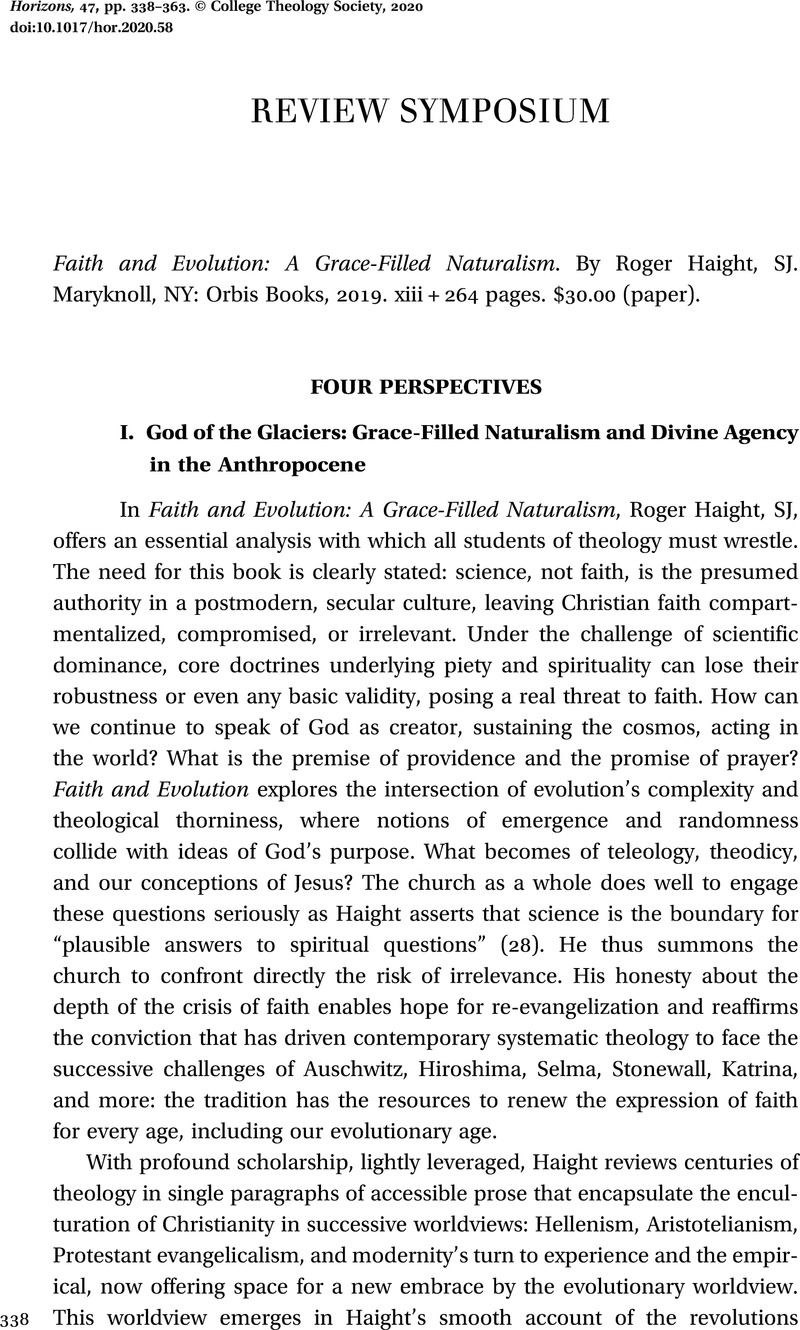No CrossRef data available.
Published online by Cambridge University Press: 15 December 2020

1 For example, Elizabeth A. Johnson issued an early call to heed the cry of the Earth and asked how natural law can still function as a moral guide if the laws of nature themselves are “shot through with chance and indeterminacy”; see “Presidential Address: Turn to the Heavens and the Earth: Retrieval of the Cosmos in Theology,” CTSA Proceedings 51 (1996): 8, 12. Marjorie Hewitt Suchocki's work on evolutionary development and sin contributes a creative spirituality of reconciliation through memory, creativity, and imagination; see The Fall to Violence: Original Sin in Relational Theology (New York: Continuum, 1995).
2 Levine, Amy-Jill, Short Stories by Jesus: The Enigmatic Parables of a Controversial Rabbi (New York: HarperCollins, 2014)Google Scholar. Aside from Levine, women theologians seem to be underrepresented in the dialogue, though many women are leading voices in the field of faith and science; witness other reviewers in this colloquium. Women do appear in the footnotes in greater density.
3 Pope Francis, Laudato Si’: On Care for Our Common Home (May 24, 2015), http://www.vatican.va/content/francesco/en/encyclicals/documents/papa-francesco_20150524_enciclica-laudato-si.html.
4 Erin Lothes Biviano, “Elizabeth A. Johnson and Cantors of the Universe: The Indwelling, Renewing, and Moving Creator Spirit and a Pneumatology from Below,” in Turning to the Heavens and the Earth: Theological Reflections on a Cosmological Conversion: Essays in Honor of Elizabeth A. Johnson (Collegeville, MN: Liturgical Press, 2016).
5 Denis Edwards, “Every Sparrow that Falls to the Ground: The Cost of Evolution and the Christ-Event,” Ecotheology 11, no. 1 (2006): 108, 114, 118.
6 John Polkinghorne, “Kenotic Creation and Divine Action,” in The Work of Love: Creation as Kenosis, ed. John Polkinghorne (Grand Rapids, MI: William B. Eerdmans Publishing Company, 2001), 96.
7 Ibid., 101.
8 Ibid., 104.
9 In this regard Polkinghorne rejects the kenosis of novelty, hoping that God may act in new ways unconstrained by divine action of the past; see Polkinghorne, “Kenotic Creation and Divine Action,” 105.
10 Ilia Delio, OSF, Crucified Love: Bonaventure's Mysticism of the Crucified Christ (Quincy, IL: Franciscan Press, 1998); The Emergent Christ: Exploring the Meaning of Catholic in an Evolutionary Universe (Maryknoll, NY: Orbis Books, 2011).
11 Gloria L. Schaab, The Creative Suffering of the Triune God: An Evolutionary Theology (New York: Oxford University Press; 2007); Trinity in Relation: Creation, Incarnation, and Grace in an Evolving Cosmos (Winona, MN: Anselm Academic, 2012).
12 J. Matthew Ashley, Interruptions: Mysticism, Politics, and Theology in the Work of Johann Baptist Metz (South Bend, IN: University of Notre Dame Press, 1998).
13 Erin Lothes Biviano, Inspired Sustainability: Planting Seeds for Action (Maryknoll, NY: Orbis Books, 2016).
14 For an excellent study, see Daniel P. Castillo, An Ecological Theology of Liberation: Salvation and Political Ecology (Maryknoll, NY: Orbis Books, 2019).
15 Glenn A. Albrecht, “Exiting the Anthropocene and Entering the Symbiocene,” Psychoterratica, December 17, 2015, https://glennaalbrecht.com/2015/12/17/exiting-the-anthropocene-and-entering-the-symbiocene/.